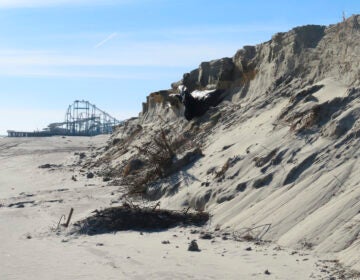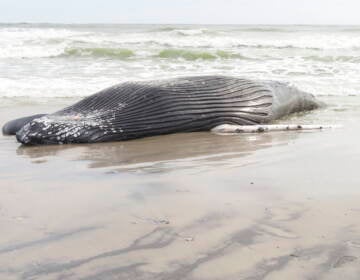Army Corps awards $23.8M contract for Atlantic County beach replenishment
It’s the latest in a years-long string of beach replenishment projects in New Jersey that have spanned all four coastal counties.

The U.S. Army Corps of Engineers Philadelphia District pumps sand onto Brant Beach, NJ in June 2013. The work is part of an effort to restore the Coastal Storm Risk Management project from damages associated with Hurricane Sandy. (U.S. Army Corps of Engineers)
Dredging and beachfill operations are slated for Absecon Island in Atlantic County, officials announced.
The U.S. Army Corps of Engineers has awarded a $23.8 million contract to Great Lakes Dredge & Dock Company of Oak Brook, Ill., to complete periodic beach nourishment in Atlantic City, Ventnor, Margate and Longport.
The work, a joint effort by the New Jersey Department of Environmental Protection, Army Corps, Avalon and local municipalities, involves the dredging of approximately two million cubic yards of sand from the Absecon Inlet and offshore, and pumping ashore. The Army Corps is coordinating with the contractor to establish a start date.
The first beachfill project in the area was constructed in 2004 in Atlantic City and Ventnor. The initial construction of the beachfill portion of the project in Margate and Longport was completed in 2018.
According to the Army Corps, the pumped sand will be built into an engineered berm and protective dune template designed to reduce impact from storms. In some areas, crews will repair dunes, beach access paths and crossovers, and sand fencing.
Sixty-five percent of the funding is from the federal government, while New Jersey and the two municipalities are covering the remaining costs.
It’s the latest in a years-long string of beach replenishment projects in New Jersey that have spanned all four coastal counties. Many of the projects have resulted in several hundred feet of expanded beach width, with dunes more than 20 feet high.
Critics have questioned the efficacy of the replenishment program, citing the need to buy out flood-prone areas, elevate homes and restore natural ecosystems. In 2019, the Surfrider Foundation, an international nonprofit environmental advocacy organization, gave New Jersey a poor grade for its coastal management practices.
Among the numerous recommendations, the report says the state should reduce its reliance on sand replenishment, utilize other methods of beach preservation, improve rebuilding standards after storms, prohibit new development in known hazard areas, establish managed retreat policies and develop sea-level rise adaptation plans.
New Jersey started working on a Coastal Resilience Plan in October 2018 to protect a regional backbone in addressing climate change and extreme weather impacts instead of more isolated, localized efforts. Its release is scheduled for September 2020.
The plan seeks to reduce the impacts of coastal hazards; increase resilience for structures, infrastructure systems, environmental resources and coastal communities; address the needs of socially vulnerable populations; and attract equitable and sustainable investment.
WHYY is your source for fact-based, in-depth journalism and information. As a nonprofit organization, we rely on financial support from readers like you. Please give today.






